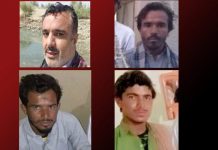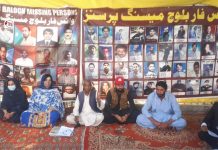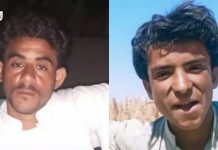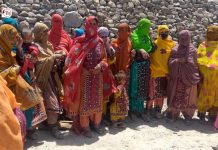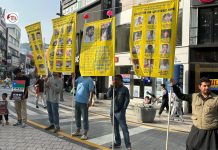Author: Zaarain Baloch
For over a decade, a group of determined activists has been braving the scorching heat and bone-chilling cold of Balochistan’s capital, Quetta, to demand justice for the Baloch missing persons. These individuals, who form the Voice for Baloch Missing Persons (VBMP), a rights group, have faced unimaginable challenges in their pursuit of the truth. From being physically attacked and harassed to enduring illegal detentions and torture, the VBMP activists have seen it all. But even in the face of such adversity, they have not wavered. On Saturday, April 1st, as the group marked the 5000th day of its peaceful protest, it is worth reflecting on the symbolic importance of the VBMP in promoting human rights and advocating for the downtrodden and unheard in Balochistan.
In Quetta’s VBMP protest camp, numerous families come together every day with a common purpose. Among them are elderly mothers in search of their missing sons, sisters seeking their lost brothers, wives yearning for their husbands, and daughters searching for their fathers. Under the shelter of the camp’s tent, they find comfort in each other’s company, knowing that they are not alone in their struggle. Even though they have been fighting for their loved ones’ return, hope is the only thing that keeps them going. Every day, they wake up with the expectation that things will be different, but unfortunately, most of them end up feeling disheartened and discontented by nightfall. Unfortunately, many have passed away with this hope still burning inside them.
Every day, the families at the VBMP protest camp carry out a symbolic hunger strike to show solidarity with their loved ones who are illegally detained. From morning till noon, they sit in the tent without eating a single bite, reflecting the dire conditions their loved ones face in detention centers where they are held without any charges or trial. By sacrificing their own meals, the families seek to raise awareness about the plight of Baloch missing persons.
The origins of the Voice for Baloch Missing Persons (VBMP) can be traced back to 2001 when Ali Asghar Bangulzai, a tailor, was detained by the security forces for the second time – it’s been over two decades, and he is yet to return home. However, it was not until October 2009 that three activists, Mama Qadeer Baloch, Nasrullah Baloch, and Farzana Majeed, established the foundation of the VBMP. Their peaceful protest began with the erection of a makeshift tent outside the Quetta Press Club, demanding the safe return of the missing persons. The tent has stood firm through numerous trials and tribulations, becoming a symbol of hope and determination in the face of adversity. Despite repeated attempts to suppress their voices, the VBMP has not wavered in its efforts, advocating for the families of the missing persons and drawing international attention to the issue.
The families of the Baloch missing persons form the backbone of the VBMP’s peaceful struggle. It’s been over two decades since Ali Asghar Bangulzai went missing, but his family is still harboring hopes for his safe return. They are still seen in protests and demonstrations held in Quetta and elsewhere, carrying placards and demanding his safe return. His son, Farooq Bangulzai, has lived much of his adult life outside of his father’s shadow. The family has numerous press conferences to draw attention to their plight and knocked on every door, from the Missing Person’s Commission all the way to the Supreme Court of Pakistan, in search of justice, but their pleas have fallen on deaf ears. The family has provided all the evidence needed to prove Bangulzai’s “enforced disappearance” to the courts, but every time, their hopes were crushed because “higher powers” further complicated the matter by pressuring the courts to delay the case.
The situation of Sammi and Mehlaab is equally grim – their father, Dr. Deen Muhammad Baloch, was picked up by the Pakistani security forces in 2009. The two sisters were still kids when their father went missing: Sammi was around ten-years-old and Mehlab was eight-years-old. The two sisters have been campaigning for their father’s safe return ever since. In 2013, 14 to 15-year-old Sammi was among the several families of Baloch missing persons who carried out the historic 3000-km long march from Quetta to Islamabad to bring attention to their plight. She met with UN and EU representatives, appealed to national and international rights groups, went to the missing persons’ commission, knocked on the doors of the Balochistan High Court and Supreme Court, and led protests and hunger strikes, but to no avail. She met with the then Prime Minister of Pakistan, Imran Khan, and Human Rights Minister, Shireen Mazari, who personally assured her and others that all Baloch missing persons would safely return home. These promises are yet to be entertained.
Thirteen years since their father’s abduction, the two sisters, once innocent kids, are now young women. They don’t know whether they are orphans or not – their mother is unsure whether she is married or widowed. Their lives were upturned in the wake of their father’s disappearance. As Sammi wrote: “The day he [Dr. Deen Muhammad] went missing, and so did a lot of other things. We lost a home, once peaceful; joy and celebration; our childhood. We lost a mother’s son, a wife’s husband, and a father to three children. When he was abducted, our entire lives came undone. Our family was in torment, suffering socially, financially, mentally, and physically. My sick mother raised us without his support and companionship. Everything we once had went missing.”
The two sisters are not alone in this struggle – there are numerous others like them. There is Seema Baloch, the sister of missing Shabbir Baloch, a student leader who went missing in 2016. There is the mother of Zakir Majeed, who went missing in 2009 and is yet to return home. His sister Farzana Majeed was one of the founders of the VBMP. There is Bas Khatoon, the elderly mother of missing Rashid Hussain Baloch, who was abducted by Emirati forces in 2018 and illegally deported to Pakistan. There’s Ali young Haidar, who was 8 years old when his father went missing in 2010, and when he was 11, he marched from Quetta to Islamabad, at least 1200 miles in search of his father. He grew up in the VBMP camp protesting for his father’s return but instead of his father’s return, the young Ali Haider himself went missing.
The VBMP activists have faced significant challenges in their peaceful protest against enforced disappearances in Balochistan. They have been subjected to attacks, illegal detentions, beatings, and threats by “state authorities and militias working under the patronage of the security forces”. Despite these adversities, the VBMP activists have continued their peaceful protest and advocacy work, demanding justice for the missing persons and their families.
During one protest in Karachi in 2022, the families of missing persons were attacked by the police and security forces. They were beaten, harassed, thrown into police vans, and taken to prison. Recounting that day, Sammi Deen Baloch wrote that she and other activists were slapped and dragged on the roads. Their phones were snatched; their chadors were pulled off of their heads. Once their headscarves were removed, the police officer mockingly told them: “Once their shalwars [trousers] are removed, then they will stop protesting.” They were called ‘disgraced women’ and accused of doing all this for fame. “You think you are a leader and are at the forefront. We will teach you a lesson”, Sammi quoted a policeman saying.
The VBMP protest camp has experienced repeated attacks and vandalism. Unidentified individuals have taken away pictures of Baloch missing persons, causing distress to their families. Additionally, the camp’s tent, which serves as a symbol of hope and solidarity for those seeking justice, has been subjected to arson and uprooting. These incidents highlight the challenges faced by peaceful protestors in their fight for truth and accountability.
In the face of all these challenges, the VBMP’s commitment to the Baloch missing persons’ cause is steadfast. The harder they are pressed, the stronger they bounce back. The group’s peaceful protest has continued for over a decade, despite facing significant challenges, and the families of Baloch missing persons have made it clear that they will not back down until their loved ones are safely returned. The VBMP has gained a reputation for its non-violent approach, which has resonated with the people of Balochistan, who have been victims of violence and human rights abuses for years.
The group’s advocacy work has brought the issue of enforced disappearances to the forefront of national and international attention. The VBMP has been successful in creating awareness and mobilizing support for the missing persons’ cause. The VBMP’s impact can be seen in the increased media coverage, public attention, and international scrutiny of the situation in Balochistan.
The government has failed to take concrete actions to address the issue of enforced disappearances, leading to a sense of hopelessness and frustration among the families of the missing persons. The so-called Commission of Inquiry on Enforced Disappearances, formed in 2011, has failed to address the issue. In a scathing review in 2020, the International Commission of Jurists (ICJ) said the commission has “wholly failed” in its mission. Furthermore, the commission disposed of thousands of cases without any proper justification and humiliated the families of missing persons’ who knocked on its door in search of justice.
As the VBMP marks its 5000th day of peaceful protest, it serves as a reminder of the transformative power of peaceful resistance. The VBMP’s steadfast refusal to be silenced in the face of adversity echoes the nonviolent campaigns of history’s most successful movements. Their commitment to the cause of human rights will not falter, even in the face of immense challenges. The enduring spirit of resistance that has kept the VBMP’s tent standing for over a decade continues to inspire and motivate countless others in their pursuit of justice. As we reflect on the VBMP’s remarkable journey, we can see the enduring legacy of their tireless efforts to promote human rights and advocate for the downtrodden and unheard in Balochistan.











